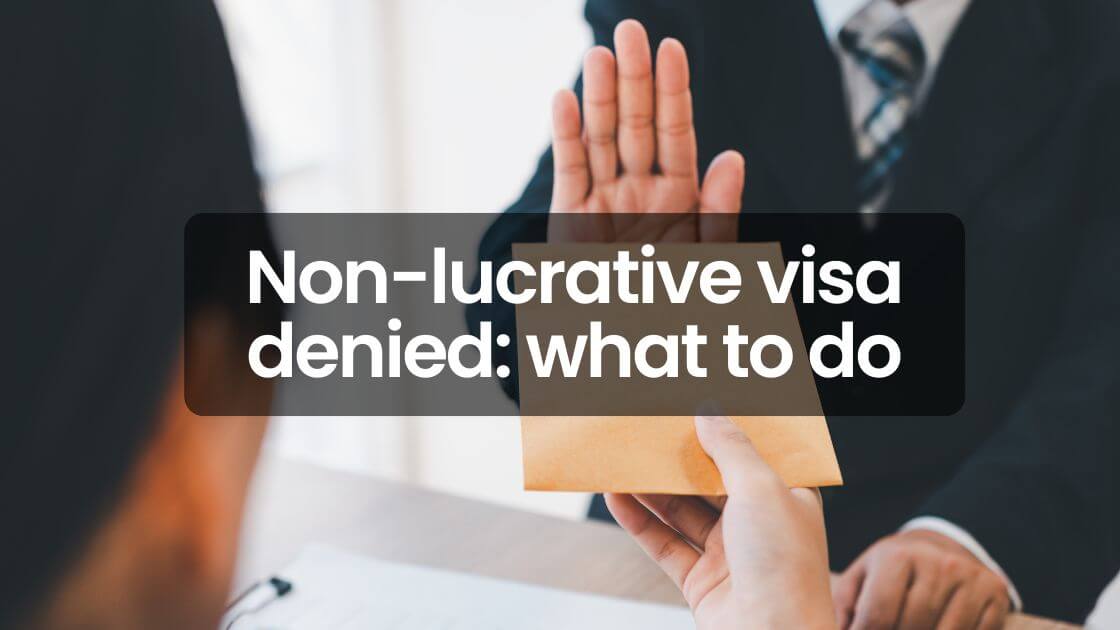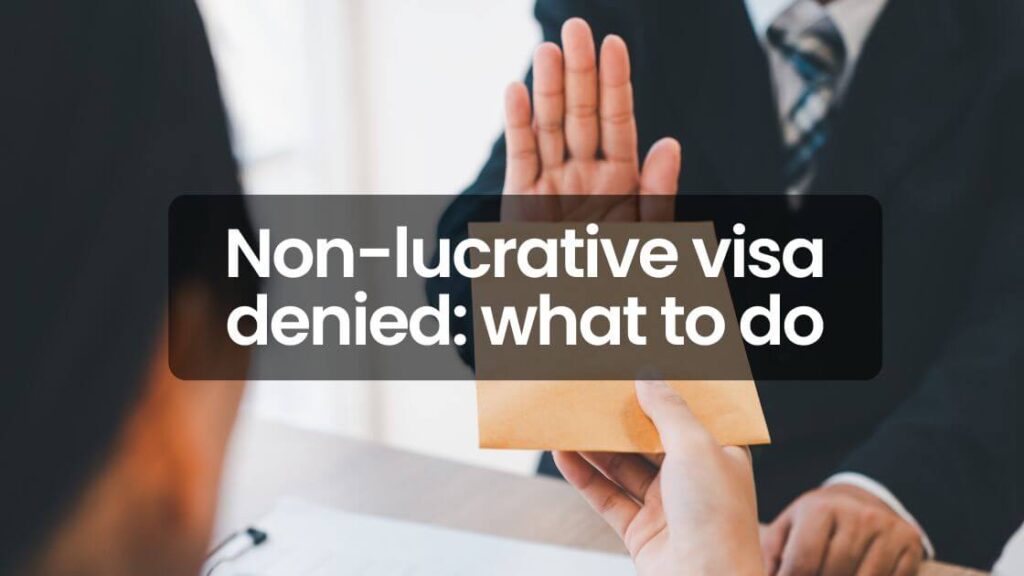
Has your non-lucrative visa application been rejected? You are not alone. Many foreigners experience the same, and many times that is because they were not aware of everything we are covering in this article.
Because even though the requirements to apply for the non-lucrative visa are quite fixed, there are some nuances one must be aware of (as well as what typically motivates the immigration office when analyzing these types of files).
Hence, keep reading, next you are going to find a complete guide on what to do if your non-lucrative visa got rejected, as well as the main reason for denial (so that you can avoid these mistakes in the future).
Content
ToggleTop reasons for Non lucrative visa denial
Even if you meet most of the requirements, your non-lucrative visa in Spain can still be denied for several reasons.
What are the most common reasons that get Spanish consulates to reject non-lucrative visa applications? Let’s explore them.
Problems with your medical insurance
Spain requires full private health insurance with no copayments or coverage limits, equivalent to the public healthcare system, and valid for your entire stay.
And we find many applications denied because the insurance policy doesn’t meet the requirements (e.g., travel insurance instead of full coverage, deductibles, or waiting periods).
To avoid issues, make sure your policy clearly states unlimited coverage in Spain and provides a certificate in Spanish. Check with an expert to validate your contract meets all these requirements, and do not settle for the cheapest option, as this may contain limitations that will get your application rejected.
Lack of proper housing (or not proper proof)
Consulates must verify that you have a place to live in Spain before granting your visa.
Failure to provide a valid rental contract, property deed, or notarized invitation letter from a host is a common reason for refusal.
Temporary bookings on platforms like Airbnb or Booking.com are not sufficient unless supported by an official long-term lease or legal documentation.
Insufficient economic means
The economic means may be one of the most important requirements when applying for this visa.
And, at the same time, one of the most frequent reasons for rejection is not having (and hence proving) enough financial resources.
Spanish authorities must confirm that you can support yourself (and any dependents) without working in Spain.
You must show regular, stable income through bank statements, pension payments, or investment earnings. If your documentation doesn’t clearly demonstrate financial solvency (or if the balance appears inconsistent with your declared lifestyle) your application may be refused.
Having criminal records
If you have a criminal record or unresolved legal matters in any of the countries where you’ve lived over the past five years, your application may be denied.
Yes, that is true for even minor offenses, as those can raise doubts about your background if not properly disclosed.
Hence, you should always submit an official, legalized criminal record certificate translated into Spanish and ensure transparency, as hiding information will almost certainly lead to refusal.
Missing documents
A missing document or incomplete file is another leading cause of visa denial. Every consulate has strict checklists, and even a small omission (for example, not including a certified translation or an Apostille) can trigger a refusal.
First of all, make sure to check the exact and specific requirements that your Spanish consulate requires (which are different from the rest of the consulates).
Then, ensure that your application form is fully completed and signed, all copies are clear and updated, and that you include every required document: passport, proof of funds, private health insurance, accommodation, and criminal record certificate.
Unclear residency intentions
If the consulate suspects that you’re applying for the non-lucrative visa only to travel freely within the Schengen Area, or that you plan to work illegally, your application will likely be denied.
You must show genuine intent to reside in Spain, providing clear reasons for your move (e.g., retirement, lifestyle, long-term relocation) and supporting documents like property ownership or family ties in Spain.
Previous visa violations or overstays
Applicants who have overstayed previous visas, worked without authorization, or had prior refusals in Spain or other Schengen countries face higher scrutiny.
Such history signals non-compliance, and the consulate may deny your new application unless you provide solid proof that your circumstances have changed.
What to do if your Non lucrative for Spain was denied?
If your non-lucrative visa for Spain was denied, the most important step is to understand why. Review the official refusal letter carefully. And if it doesn’t specify the reasons, contact the Spanish consulate or embassy to request clarification.
Once you know the cause, you can appeal the decision or reapply. The appeal (recurso de reposición) must be filed within one month and should directly address the reasons for denial, including any missing or corrected documents. If the problem was administrative or due to incomplete paperwork, it’s often simpler to fix it and reapply.
For denials related to financial means, health insurance, or incomplete documentation, reinforce your file with updated bank statements, compliant medical coverage, and properly legalized and translated documents.
It’s also essential to review the timing and format of your previous submission. Some rejections occur simply because the documentation was outdated or the translations were not done by a certified translator.
Ensuring that every document is recent, correctly apostilled, and presented in the right order can make a big difference in the outcome.
If your visa was denied due to inconsistent information, make sure that all data provided in your reapplication (such as addresses, financial amounts, or family details) matches perfectly across documents. Even small discrepancies can raise doubts about the authenticity of your case.
Lastly, be prepared to explain your situation clearly if you are called for an interview in the reapplication process. Demonstrating that you understand the visa conditions, that you have sufficient means to live in Spain without working, and that you genuinely intend to reside in the country will strongly support your case and increase the chances of approval.
How to prevent your non-lucrative visa denial?
The answer is simple: seek expert legal assistance.
With the help of an expert immigration lawyer, not only will you ensure your application is successful from the very first try, but that will help you save time and money with subsequent applications or requirements.
An expert lawyer will have the experience of other clients in your same situation in your same Spanish consulate, hence the nuances that are particular to it will be made clear from the beginning.
They will also carefully review all your documents so that they comply with the actual requirements.
At Immigration Lawyers Spain, we have processed over 1000 non-lucrative visa applications over our more than 40 years of experience, and now we want to help you. Book an appointment with us through the following link, and get started today while avoiding visa rejections:
Get in touch with our lawyers and let us guide you step by step:





